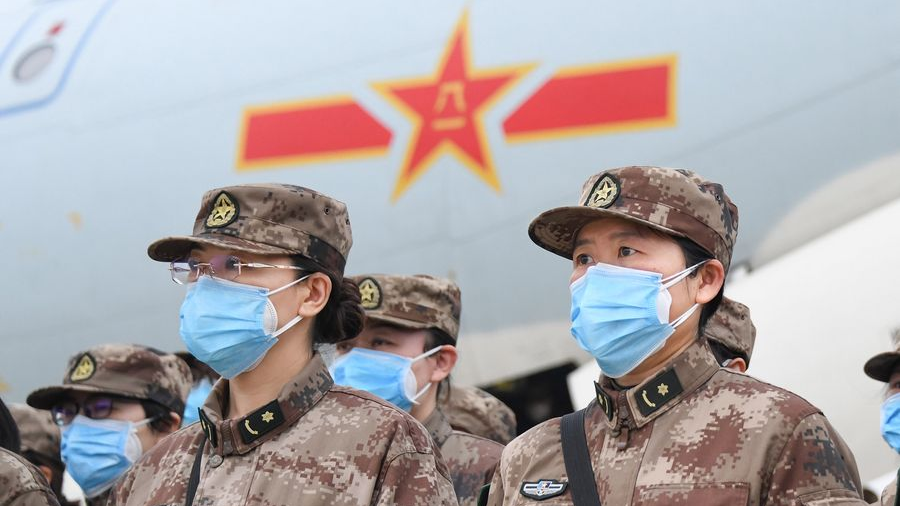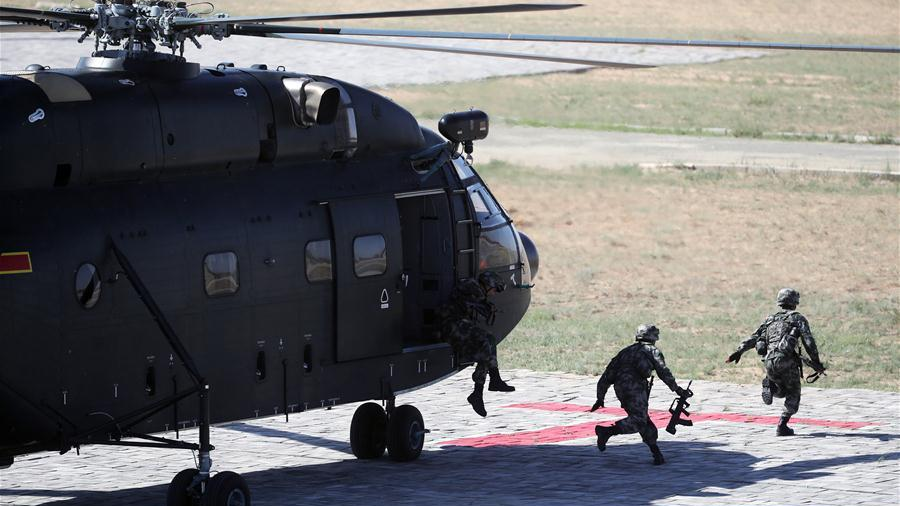
Military medical staff airlifted by eight large transport planes of the air force of the People's Liberation Army (PLA) arrive at Tianhe International Airport in Wuhan, central China's Hubei Province, February 2, 2020. /Xinhua
Military medical staff airlifted by eight large transport planes of the air force of the People's Liberation Army (PLA) arrive at Tianhe International Airport in Wuhan, central China's Hubei Province, February 2, 2020. /Xinhua
Editor's note: Li Yun is a researcher at the Institute of Foreign Military Research of the Department of War Research, China's People's Liberation Army (PLA) Academy of Military Sciences. The article reflects the author's opinions, and not necessarily the views of CGTN.
Released in a draft budget report issued at the 4th session of the 13th National People's Congress (NPC), China's defense budget in 2021 will be about 1.35 trillion yuan (about $209 billion), an increase of 6.8 percent over last year.
Some foreign experts and media began to accuse China of having opaque defense spending data, that China's defense spending growth is for military expansion and will threaten regional and world peace. However, the facts will once again refute these allegations.
First, the data on China's defense expenditure are true and reliable. China applies strict mechanisms of fiscal allocation and budget management on its defense expenditure. Since 1978, the Chinese government has submitted annual budget reports to the NPC and released the total amount of defense budget transparently.
Since 2007, China has joined the UN Standardized Instrument for Reporting Military Expenditures and has submitted annually to the UN the basic data on its defense expenditure for the latest fiscal year, reporting total spending as well as personnel expenses, training and sustainment expenses, and equipment expenses for the active force, reserve force and the militia respectively, along with an explanation of the application of China's defense expenditure and its ratio to GDP.
It can be said that since the reform and opening-up, China has been announcing its defense expenditure to the world in an open and honest manner. The UN Standardized Instrument for Reporting Military in which China participates is recognized by countries all over the world.
Second, the growth of China's national defense expenditure is moderate, in order to maintain the country's security and development, is in line with its defensive military strategy.
Although China's total defense expenditure ranks second in the world, it is only a quarter of that of the United States. Among countries ranking high in defense expenditure, China's share of defense expenditure in GDP and government expenditure, as well as per capita and per-service person defense spending, are all at a relatively low level.
Last year, China was the only major country in the world that achieved economic growth. Although other major economies are in recession, their growth of defense expenditure has continued to maintain a relatively high level, even higher than that of China. For example, India's defense budget increased by about 20 percent, and Japan's defense budget increased by more than 8 percent.

Soldiers of airborne elite troops attend a military parade at Zhurihe training base in north China's Inner Mongolia Autonomous Region, July 30, 2017. /Xinhua
Soldiers of airborne elite troops attend a military parade at Zhurihe training base in north China's Inner Mongolia Autonomous Region, July 30, 2017. /Xinhua
With a borders totaling more than 22,000 kilometers and a coastline of more than 18,000 kilometers, China is one of the countries with the largest number of neighboring countries, the longest land boundary and the most complicated surrounding security situation in the world. To bring about the complete reunification of China is the common aspiration of all Chinese, both in the country and overseas. The task of safeguarding territorial sovereignty, maritime rights and interests and national unity is arduous and onerous.
In this regard, the spokesperson of the China's Ministry of National Defense pointed out, "The risks and challenges facing our country's homeland security cannot be ignored. Land border disputes have not been completely resolved; island territorial issues and maritime delimitation disputes still exist. The DPP (Democratic Progressive Party) authorities stubbornly adhere to the separatist position of 'Taiwan independence,' which is the biggest realistic threat to peace and stability in the Taiwan Straits."
Third, China's moderate increase in defense spending is also to better fulfill its responsibilities as a big power and safeguard world peace.
At present, the instability and uncertainty facing international security have become more prominent. The COVID-19 pandemic is rampant all over the world. Hegemonism, power politics and unilateralism are on the rise from time to time. Regional conflicts and local wars continue, and the international security system and order are constantly under attack. The international community has more expectations for the Chinese army to provide public security.
In recent years, China has actively fulfilled international responsibilities of the military of major powers, comprehensively promoted international military cooperation in the new era, and participated in international peacekeeping, maritime escort, humanitarian rescue and other operations. It is one of the major contributors to UN peacekeeping operations and the largest troop contributor among the permanent members of the Security Council, striving to make its own contribution to building a better world of lasting peace and universal security.
Taking the COVID-19 pandemic for example, the Chinese military has provided support and assistance within its capacity to other countries through various methods such as vaccine assistance and dispatching expert teams, which has been widely praised by the international community. Therefore, the increase in China's defense expenditure is not only to maintain its own security, but also to help maintain world peace.
(If you want to contribute and have specific expertise, please contact us at opinions@cgtn.com.)

